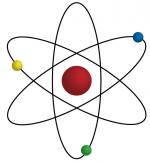|
This section contains 576 words (approx. 2 pages at 300 words per page) |

|
All matter, for practical purposes, is composed of atoms. They are discrete entities and indivisible under normal circumstances. This has a profound effect on all of chemistry in that any compound must be composed of a whole number of atoms. That is, oxygen may occur as a compound containing 2 oxygen atoms (which is commonly referred to a molecular oxygen) or a compound containing 3 oxygen atoms ( called "ozone") but never as a compound containing 2.5 oxygen atoms. Fractional coefficients can be used in chemical formulas but they have very specific meanings. Discrete molecular entities must always contain a whole number of atoms.
Another important property of atoms is that they can not change into one another. That is, under normal circumstances, an atom of oxygen will always be an atom of oxygen (see nuclear chemistry for exceptions). Certainly within the context of ordinary chemical reactions this must be...
|
This section contains 576 words (approx. 2 pages at 300 words per page) |

|


